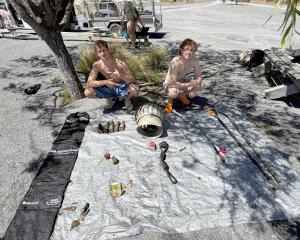Farmers Jim Crawford and Paul Murray say the issue has continued to plague their Lawrence farms despite meeting forestry companies a year ago.
Fed-up with a lack of progress, they met representatives of foreign-owned Matariki Forests in Lawrence last week.
Mr Crawford said Matariki Forests remained "difficult" on what was agreed on pig control compared with other forestry companies.
While other forestry companies would let farmers on to their blocks to kill problem pigs, Matariki had denied them access.
"It is their way or no way."
Mr Crawford said wild pigs never used to be a problem but now it looked like it was one which would never go away, no matter the intensity of the pest control.
"It has spiralled out of control."

A herd of pigs could eat a third of a lamb flock and ewes spooked by wild pigs often mismothered their lambs.
Matariki Forests regional manager Hamish Fitzgerald described last week’s meeting as "positive".
But he stressed the forests were active operations with ongoing logging, roading and silviculture work.
"The safety of our people is our highest priority and, as such, access needs to be strictly controlled.
"Uncontrolled entry to hazardous worksites presents a serious and unacceptable safety risk to our own people and to our visitors."
He said the meeting resulted in an agreed action plan that built on existing efforts.
The plan includes the hunting of wild pigs in its forests before lambing begins, Mr Fitzgerald said.
"We are committed to continuing this collaborative approach to deal with the wild pig population."
Mr Crawford said Port Blakely Companies, Earnslaw One and Wenita Forest Products managed forestry blocks neighbouring his 1200ha sheep and beef property Strathore Farm.
All of those companies made it easy for farmers to access their blocks to hunt wild pigs as soon as a herd had been impacting a farm operation.
In contrast Matariki had a "staunch" rule charging hunting clubs to have exclusive access to their blocks and did not allow farmers access at short notice.
Matariki Forests were unwilling to work with farmers making a living near their plantations.
"I find that frustrating," Mr Crawford said.
"I don’t think you should be trespassed if you are trying to save your own land."
A "huge" frustration was pigs often being left to thrive in Matariki Forests, as no club members were hunting its blocks when it was needed most, Mr Crawford said.
"You have to get the pig numbers as low as possible leading up to lambing."
Mr Murray, who manages his family farm Munro Valley Farms near Lawrence, said forestry surrounded the farm.
"We are the last man standing."
His family had been on the 740ha sheep and beef farm for more than 20 years.
A wild pig was once a rare sight on the farm.
Now wild pigs were rife and were destroying pasture on the farm.
He estimates the impact of wild pigs cost his family farm business about $40,000 last year and about $20,000 this year.
Recently, he shot a herd of eight pigs and most were pregnant sows.
Paul’s father, Munro Valley Farms owner Alan Murray, said he needed to destock 300 ewes because pigs had ruined about 20ha of his farm.
Forestry, which was often owned by overseas companies, was hindering his family’s farming operation.
"It is not bloody good enough."
An ongoing frustration was the delay between farmers reporting damage to Matariki Forests and the arrival of their pest control contractors.
The control work needed to be completed as soon as possible, preferably by local people, who had local knowledge on the gullies were pigs hid, he said.
Federated Farmers Otago president Luke Kane hoped that after a "long battle", all parties were finding a way forward.
"After some lengthy conversations and disagreements, we hopefully have a plan to aid the farmers pre-lambing and then to collectively work to come up with a long-term solution."
The government granted a consent for Matariki Forests & Matariki Forests Trading Ltd to acquire existing forests to continue to replenish and grow its forestry assets in January last year.

















